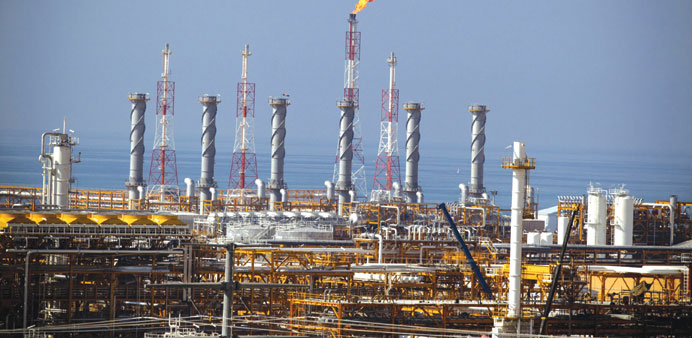A general view of the phase 19 of the South Pars gas field in the southern Iranian port of Assaluyeh, some 1,000km south of Tehran. Iran’s latest five-year plan, running from 2010-2015, calls for $230bn (€170bn) of investment in its petroleum industry, of which $150bn would go to upstream activities, according to the official IRNA news agency.
AFP/Tehran
Iran urged foreign companies to return to its oil sector yesterday as a major French business delegation visited Tehran in the hope Western sanctions may soon be lifted.
In a speech to the delegation, Deputy Oil Minister Ali Majedi said Iran’s latest five-year plan, running from 2010-2015, calls for $230bn (€170bn) of investment in its petroleum industry, of which $150bn would go to upstream activities, according to the official IRNA news agency.
In his remarks to dozens of representatives from the French employers’ union Medef, he added that Iran was reviewing its contracts to encourage foreign investment.
He said nearly all downstream projects, for refineries and distribution, would be offered on a build-operate-transfer (BOT) or build-own-operate-transfer (BOOT) basis.
Major oil companies have steered clear of Iran in recent years because of strict Western sanctions aimed at curbing Tehran’s nuclear activities.
Western countries have long suspected Iran of covertly pursuing nuclear weapons alongside its uranium enrichment programme, allegations denied by Iran.
But last year’s election of President Hassan Rohani, a reputed moderate, and the clinching of a landmark nuclear deal in November, have prompted an increasing number of high-level visits by diplomats and business people.
The French delegation is the largest of its kind from Europe since the November agreement. It includes 116 representatives, both from major companies like Total, Lafarge and Peugeot as well as small and medium-sized firms. “Some have come to update their records and make contacts. Some companies are asking to know when they can resume operations in Iran, while others are researching opportunities,” Medef vice president Thierry Courtaigne told AFP.
The November agreement between Iran and the P5+1 - Britain, France, the US, Russia and China plus Germany—requires Iran to scale back its nuclear activities for limited sanctions relief.
The six-month accord, which took effect January 20, is aimed at buying time for a comprehensive agreement that could see sanctions lifted on the oil and gas-rich country with a population of 76mn people.
The agreement would only loosen restrictions on the export of automobiles, aerospace products, precious metals and petrochemicals, without affecting the far more damaging restrictions on Iran’s access to banks and its oil and gas exports.
The nuclear negotiations are set to resume February 18.
But a senior US official said last month the easing of some sanctions “does not mean Iran is open for business”.
“Quite on the contrary, the overwhelming majority of our sanctions, and the basic structure of oil and banking sanctions remain in place,” the official said.
Oil giants Total and GDF-Suez have nonetheless sent representatives to Tehran to explore a possible return to the country.
Iran possesses the world’s fourth-largest oil reserves and the second-largest gas reserves, but its petroleum exports have plummeted more than 50% because of the sanctions.

